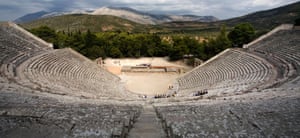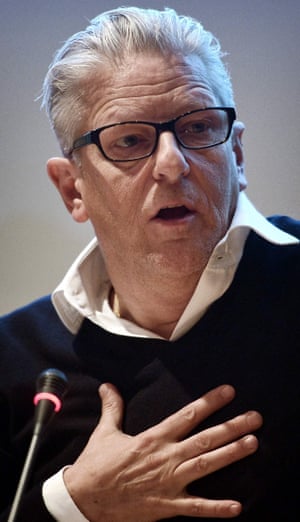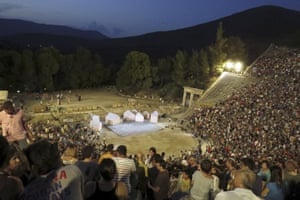
The ancient Epidaurus theatre in the Peloponnese, one of the festival’s stunning locations. Photograph: Alamy/Bildarchiv Monheim
The Athens and Epidaurus festival has seen its fair share of drama in its 61 years. Maria Callas and Luciano Pavarotti sang there; Margot Fonteyn and Rudolf Nureyev danced. Through the years of Greece’s military dictatorship, democracy and economic crisis, the annual summer celebration of the arts has inspired and provoked.
This year, however, the festival has succeeded on both fronts before it has even begun – and not, perhaps, in the way its backers had hoped.

The Belgian artist Jan Fabre has resigned as artistic director after local artists rebelled against his plan to turn Greece’s major arts festival into “a tribute to Belgium” and devote eight of the festival’s 10productions to those from his homeland.
“Athens and Epidaurus festival is much more than a festival; it’s a cultural institution and already an international one, said Melpomeni, a stage photographer based in Athens who did not give her surname. “We welcome international participations, not international takeovers”.
Sasha, a painter from Corfu, said Fabre’s plan had left “no space for emerging artists” and distorted the character of the festival, which runs from June to the end of August and is held mainly in Athens and the ancient theatre of Epidaurus in the Peloponnese.
“I’m all for innovation, but when it concerns a culturally significant event on this scale, far more respect needs to be paid to its origins, character and sociocultural context – especially at this time,” she added.

Others have accused Fabre of cultural colonialism, drawing parallels with the treatment Athens is perceived to have received from Brussels during the eurozone crisis.
After the row erupted last week, when the acclaimed multidisciplinary artist announced his vision of a festival in the “Belgian spirit”, Fabre tendered his resignation. “I do not want to work in a hostile artistic environment in which I came with an open mind and heart,” he said in a statement on Saturday.
“I accepted the invitation by the Greek minister of culture on the condition that I could do my artistic choices under a regime of freedom. This is not possible any more in Greece,” he added.
The minister, Aristides Baltas, has called Fabre’s decision “the result of a coordinated attack by political parties, the media and a section of the artistic community”.
Baltas defended Fabre’s programme as an attempt to internationalise the festival and popularise Greek art abroad. While this year’s focus was to have beenBelgium, one third of the programme at the next two festivals would have been devoted to Greek artists.
But some artists have pinned the blame on Baltas, and have called for his resignation. The actor and director Dinos Psychogios told the Guardian: “The government has full responsibility for what happened, not Mr Fabre. They invited an artist without making clear the context in which he was supposed to work, only two months before the festival.”
Some even sided with Fabre. Speaking before he quit, one 37-year-old theatre director and screenwriter, who did not want to give their name, said: “The selected few who were produced and reproduced [at the festival] never demanded a more meritocratic and democratic procedure to the selection of the Greek productions. And the exact same people are the ones who are now furious with Jan Fabre. The festival was a place for few friends and now it’s a place for few less. Why is this so shocking?”
The row has left open wounds in the artistic world. Fabre’s successor – the director Vangelis Theodoropoulos, 63, who was announced on Monday – has a challenge on his hands.
“The new artistic director’s task is tough, but we are certain that the director will cooperate constructively with the board of the Greek festival as well as the Greek artists for the result to be the best possible in the current circumstances,” the ministry said in a statement obtained by Reuters.











